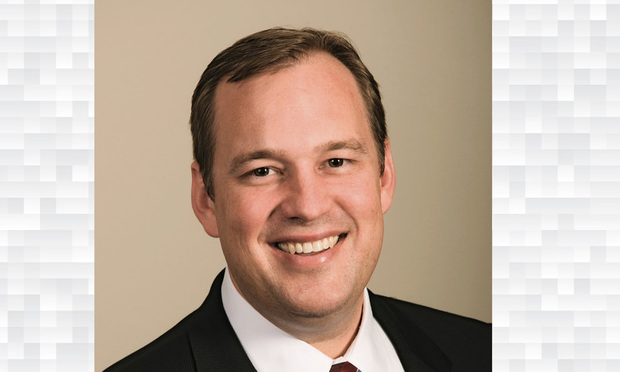Appellate Lawyer of the Week: Austin Lawyer Wins by Losing at the Fifth Circuit
“I didn't think I'd ever have to stand up there and argue that my client should lose,” Kurt Kuhn said.
September 10, 2018 at 05:02 PM
5 minute read
 Austin appellate lawyer Kurt Kuhn. Courtesy photo
Austin appellate lawyer Kurt Kuhn. Courtesy photo
Veteran Austin appellate lawyer Kurt Kuhn never thought he'd have to go the U.S. Court of Appeal for the Fifth Circuit just so his clients could voluntarily dismiss a claim against a defendant—with prejudice.
“I didn't think I'd ever have to stand up there and argue that my client should lose,” Kuhn said.
But that's what he did recently, prompting a Fifth Circuit decision that he believes will help protect the government's interest in choosing which qui tam actions it wants to pursue in the future.
The case Kuhn wanted kicked out of court was Vaughn v. United Biologics, a qui tam action brought before U.S. District Judge Lynn Hughes of Houston in 2013, accusing the defendant company of paying illegal Medicare kickbacks.
The U.S. government entered an appearance in the Vaughn case a month after it was filed, and asked for and received five separate extensions to the initial 60-day deadline to make its decision whether to intervene in the case, notifying the court that the case was nationwide in scope and involved the cooperation of agencies in several different states.
In 2014, while the Vaughn case was under seal, a similar qui tam case was filed against the same defendant, United Biologics, in U.S. District Court in the Northern District of Georgia. Hughes partially unsealed the Vaughn case to permit the government to notify the court about the Georgia litigation.
In 2015, the government gave notice to Hughes that it had decided not to intervene in the Vaughn litigation. And after Hughes denied United Biologics' motion to dismiss the case, the defendants filed a motion requesting the Houston judge order that the Georgia qui tam be transferred to his court.
In 2016, after Hughes quashed discovery in the Vaughn case, the Vaughn plaintiffs voluntarily moved to dismiss their case against United Biologics with prejudice as to them, but without prejudice to the government.
During a hearing on the issue in 2017, the Vaughn plaintiffs lawyers explained the purpose of their suit was to make the government aware of United Biologics' alleged fraud—which they achieved, but then their client grew tired of litigating without the government's assistance.
The Vaughn plaintiffs also said during the hearing that they had no interest in suing United Biologic again, and were waiving a sharing agreement they had with plaintiffs in the Georgia case for any recovery obtained as a result of the out-of-state litigation.
Hughes later summoned a government lawyer during the hearing to explain why the United States was not intervening in the Vaughn case. That lawyer explained that the U.S. government does not typically state a specific reason for declining to intervene in a qui tam case because such a reason “could arguably influence any sort of litigation that comes after.”
Although Hughes was skeptical and frustrated by the governments response, according to the decision, he ultimately granted the Vaughn plaintiffs' motion to dismiss, but noted concerns that it was “absolutely clear” that the government intended to pursue the same claims against United Biologics in Georgia.
United Biologics asked Hughes to reconsider the motion to dismiss the case based on new evidence that the government altered the course of the Georgia litigation in light of the Vaughn plaintiffs' decision to dismiss their claims. Hughes denied United Biologics' request—a decision they appealed to the Fifth Circuit.
In her Sept. 7 decision, Fifth Circuit Judge Edith Brown Clement noted that the court has not yet decided whether a non-intervening government can be dismissed without prejudice from a qui tam claim when relators voluntarily dismiss themselves with prejudice.
Clement concluded that Hughes was correct to dismiss the case in his court—even without more explanation from the government—noting that a more specific response would compromise the government's litigation strategy.
“While the court was frustrated by the lack of detail in the response, it is clear that the court—and, notably, the defendants—understood the government's reasoning: it was consenting to the dismissal of these relators because of the ongoing qui tam litigation elsewhere. The district court's order, by dismissing only the relators with prejudice, clearly reflects an ultimate acceptance of the government's explanation,” Clement wrote.
“In short, there is enough in the record here to discern an adequate basis for the government's and district court's consent to the realtor's dismissal,” Clement concluded. “Even if we were to require some baseline explanation requirement, this would meet it.”
Kuhn, who represented the Vaughn plaintiffs before the Fifth Circuit, was pleased with the decision.
“My clients said that this is enough,” Kuhn said of their reasons for dismissing their own claims with prejudice. “And we said our entire point of this was to get the government to investigate it, and they did investigate it.”
Casey Low, a partner in the Austin office of Pillsbury Winthrop Shaw Pittman who represents United Biologics, declined to comment on the decision.
Kuhn believes the Fifth Circuit's ruling is important because, had his clients lost, the government would likely be required to intervene in all similar qui tam cases—no matter how strong they are—to protect its own interest.
Kuhn explained that one of the reasons the government has to intervene in the Georgia case is because the plaintiffs there are whistleblowers from within the defendant company, while his clients were not employees of United Biologics.
“It would be untenable” for qui tam claims generally if his client lost the case, Kuhn said. “Whoever filed first would be able to turn to the government and tell them, 'look, you need to try this because I'm not going to.'”
This content has been archived. It is available through our partners, LexisNexis® and Bloomberg Law.
To view this content, please continue to their sites.
Not a Lexis Subscriber?
Subscribe Now
Not a Bloomberg Law Subscriber?
Subscribe Now
NOT FOR REPRINT
© 2025 ALM Global, LLC, All Rights Reserved. Request academic re-use from www.copyright.com. All other uses, submit a request to [email protected]. For more information visit Asset & Logo Licensing.
You Might Like
View All

Eversheds Sutherland Adds Hunton Andrews Energy Lawyer With Cross-Border Experience
3 minute read
Ex-Marathon General Counsel Takes Legal Reins of Another Energy Company

After Nearly 2 Decades in the Role, Longtime Haynes and Boone General Counsel Passes the Baton
3 minute readTrending Stories
- 1'It's Not Going to Be Pretty': PayPal, Capital One Face Novel Class Actions Over 'Poaching' Commissions Owed Influencers
- 211th Circuit Rejects Trump's Emergency Request as DOJ Prepares to Release Special Counsel's Final Report
- 3Supreme Court Takes Up Challenge to ACA Task Force
- 4'Tragedy of Unspeakable Proportions:' Could Edison, DWP, Face Lawsuits Over LA Wildfires?
- 5Meta Pulls Plug on DEI Programs
Who Got The Work
Michael G. Bongiorno, Andrew Scott Dulberg and Elizabeth E. Driscoll from Wilmer Cutler Pickering Hale and Dorr have stepped in to represent Symbotic Inc., an A.I.-enabled technology platform that focuses on increasing supply chain efficiency, and other defendants in a pending shareholder derivative lawsuit. The case, filed Oct. 2 in Massachusetts District Court by the Brown Law Firm on behalf of Stephen Austen, accuses certain officers and directors of misleading investors in regard to Symbotic's potential for margin growth by failing to disclose that the company was not equipped to timely deploy its systems or manage expenses through project delays. The case, assigned to U.S. District Judge Nathaniel M. Gorton, is 1:24-cv-12522, Austen v. Cohen et al.
Who Got The Work
Edmund Polubinski and Marie Killmond of Davis Polk & Wardwell have entered appearances for data platform software development company MongoDB and other defendants in a pending shareholder derivative lawsuit. The action, filed Oct. 7 in New York Southern District Court by the Brown Law Firm, accuses the company's directors and/or officers of falsely expressing confidence in the company’s restructuring of its sales incentive plan and downplaying the severity of decreases in its upfront commitments. The case is 1:24-cv-07594, Roy v. Ittycheria et al.
Who Got The Work
Amy O. Bruchs and Kurt F. Ellison of Michael Best & Friedrich have entered appearances for Epic Systems Corp. in a pending employment discrimination lawsuit. The suit was filed Sept. 7 in Wisconsin Western District Court by Levine Eisberner LLC and Siri & Glimstad on behalf of a project manager who claims that he was wrongfully terminated after applying for a religious exemption to the defendant's COVID-19 vaccine mandate. The case, assigned to U.S. Magistrate Judge Anita Marie Boor, is 3:24-cv-00630, Secker, Nathan v. Epic Systems Corporation.
Who Got The Work
David X. Sullivan, Thomas J. Finn and Gregory A. Hall from McCarter & English have entered appearances for Sunrun Installation Services in a pending civil rights lawsuit. The complaint was filed Sept. 4 in Connecticut District Court by attorney Robert M. Berke on behalf of former employee George Edward Steins, who was arrested and charged with employing an unregistered home improvement salesperson. The complaint alleges that had Sunrun informed the Connecticut Department of Consumer Protection that the plaintiff's employment had ended in 2017 and that he no longer held Sunrun's home improvement contractor license, he would not have been hit with charges, which were dismissed in May 2024. The case, assigned to U.S. District Judge Jeffrey A. Meyer, is 3:24-cv-01423, Steins v. Sunrun, Inc. et al.
Who Got The Work
Greenberg Traurig shareholder Joshua L. Raskin has entered an appearance for boohoo.com UK Ltd. in a pending patent infringement lawsuit. The suit, filed Sept. 3 in Texas Eastern District Court by Rozier Hardt McDonough on behalf of Alto Dynamics, asserts five patents related to an online shopping platform. The case, assigned to U.S. District Judge Rodney Gilstrap, is 2:24-cv-00719, Alto Dynamics, LLC v. boohoo.com UK Limited.
Featured Firms
Law Offices of Gary Martin Hays & Associates, P.C.
(470) 294-1674
Law Offices of Mark E. Salomone
(857) 444-6468
Smith & Hassler
(713) 739-1250






